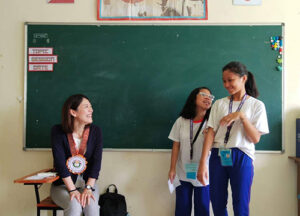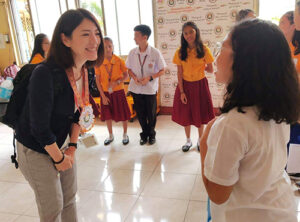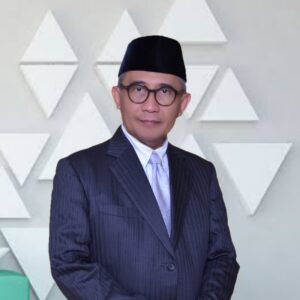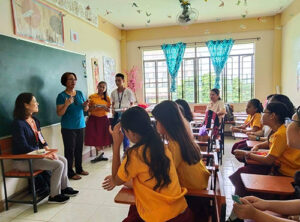2022.10.12
LANGUAGE“NIHONGO Partners,” Bringing Living Language and Culture to Middle and High-School Students Studying Japanese in Asia

The “NIHONGO Partners” program dispatches Japanese citizens to Asian countries where the Japanese language is taught, to support classes in local schools. This new form of international exchange began in 2014 and has continued, enduring through the COVID-19 pandemic.
Do you know about “NIHONGO Partners,” who are dispatched to middle and high schools in Southeast Asia and other Asian countries as assistants for Japanese language lessons and to introduce the culture of Japan? Over eight years between 2014 and 2021, the Japan Foundation (JF) dispatched approximately 2,500 NIHONGO Partners to 12 countries and regions: Brunei, Cambodia, China, Indonesia, Laos, Malaysia, Myanmar, the Philippines, Singapore, Taiwan, Thailand and Vietnam, with many scheduled to arrive in 2022.

With their diverse backgrounds, NIHONGO Partners are the perfect candidates to convey the real-life image of the Japanese people. For those living in the communities to which they are dispatched, it can be their first encounter with a Japanese person.
Although the requirements for NIHONGO Partners vary depending on the location, an applicant must be (1) between 20 and 69 years of age and a Japanese national, (2) competent in daily conversation in English and (3) available to participate in the whole training schedule prior to their departure (approximately 4 weeks).
Applications are accepted from anyone and neither knowledge of nor experience in Japanese language education is required. Once they pass the application screening and interviews, applicants will go through their pre-dispatch training before departing to their destinations for up to one year. Why dispatch NIHONGO Partners when they are not specialists in Japanese language education? The answer is that in the Asian region, second-language education is well developed and Japanese has always been a popular second language. Additionally, after the 2000s, more people from the younger generations became interested in the Japanese language through pop culture and Japanese companies began to expand into the region.
For these reasons, Japanese language education became popular even at a middle school level. However, even today, increases in the number of teachers and opportunities to meet in person with Japanese citizens have failed to keep pace with the rapid increase in the language’s popularity.
In addition to the more recent dispatch of NIHONGO Partners, JF has been dispatching specialists to support Japanese language education institutions around the world since its establishment in 1972. We believe that having Japanese citizens serve as partners of Japanese language education across a wider range of educational settings and on a closer level will provide more complete support for students and teachers in each country.
What Does It Mean for Japanese Citizens to Set Foot in Local Areas?
“To further understand Japanese language and Japanese culture, the NIHONGO Partners program is a highly strategic and excellent method,” says Prof. Dr. Ir. Achmad Jazidie, the Director General of Secondary Education at the Ministry of Education and Culture of the Republic of Indonesia when this program was initiated in 2014 and who signed the agreement for the implementation of the program as the person in charge. “It is crucial to pass on language and culture from person to person, and face to face. When Japanese citizens as NIHONGO Partners were dispatched to Indonesian high schools, I highly expected them to go beyond teaching the language and tell us about what it means to be Japanese.”

Prof. Achmad Jazidie currently holds the position of Rector of Nahdlatul Ulama University Surabaya. He comments, “I wish for the program to continue and dispatch even more NIHONGO Partners.”
With his background of studying abroad in Japan during the 1980s and 1990s, Prof. Jazidie felt a strong need for Japanese language education for the younger generations of his country as the future workers. Also, as Indonesia is a large country with many islands, there was the problem of educational disparities by region. From that perspective, NIHONGO Partners were valuable as they were dispatched even to rural areas.
The mission of NIHONGO Partners includes learning the local language, understanding the local culture and spreading that experience extensively. “We have many Muslims in our country and they are often perceived as scary or frightening. I believe that the NIHONGO Partners program is a great system for Japanese people to get rid of such prejudices and understand the real Indonesia,” says Prof. Jazidie.
Just as Prof. Jazidie says, a majority of our NIHONGO Partners have accumulated intercultural exchange experiences, which cannot be attained through ordinary travel, at their dispatch destinations. Ms. TAMAOKI Chika is one such partner. She was sent to Manila, the capital of the Philippines, for eight months from July 2019. Previously, Ms. Tamaoki worked in real estate. Although she had traveled to the Philippines before, she says, “Working at a local high school and living within the community, I have learned many things about the local lifestyle I never knew such as the Filipino nature of cherishing family and friends.” Keeping in mind that the NIHONGO Partners’ job at school is to take on a supportive role, she made an effort to make it easier for the teachers to conduct classes by taking charge in the Japanese pronunciation lessons, writing on blackboards and introducing the culture.

Ms. Tamaoki was dispatched to the Tondo district, an impoverished area in Manila. She taught 12 Japanese language classes four days a week, making sure that the students enjoyed learning the Japanese language and culture. To this day, she still exchanges messages through social media with the people she met there.
What Are the Benefits of Mutual Cross-Cultural Understanding?
Ms. Tamaoki says, “I believe I myself evolved at my dispatch destination. There were times when things did not go according to plan or I was put in charge of something out of the blue and thanks to that, I became more flexible and less concerned about trifling matters.” She is now working for a support company related to the Specified Skilled Worker program and is in charge of teaching Filipinos who come to Japan as foreign skilled interns. “Thanks to my experience as a NIHONGO Partner through which I was able to further understand Filipinos and their culture, I can communicate smoothly and know how to convey the Japanese language and culture. From now on, I would like to use my teaching skills to pay back the support and kindness I received from the Filipino community.”
To meet the growing needs and expectations from Japanese language education institutions and learners in Asian countries, the NIHONGO Partners program continues to expand. In an era when we can connect with the world online easily, the value of real human connections, like those offered by NIHONGO Partners, is perhaps even greater.
【Related pages】
A Second Home for Overseas Japanese Language Teachers, Training Programs Offered by the Japanese-Language Institute, Urawa
